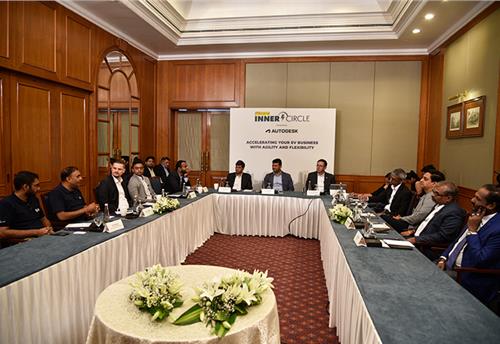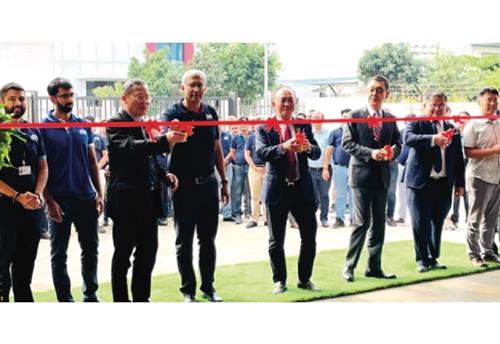Rane Brake Lining takes TQM route for growth
Eight-year-old Trichy plant spearheads quality processes and sets the base for a big leap in turnover by the year 2017. Sumantra B Barooah visits the facility.
Eight-year-old Trichy plant spearheads quality processes and sets the base for a big leap in turnover by the year 2017. Sumantra B Barooah visits the facility.
When Rane Brake Lining (RBL) decided to set up a plant at Trichy, 350km from Chennai, in 2006, the company’s Japanese partner Nisshinbo wanted it to import all the equipment the unit would require to ensure that it would manufacture global quality components.
However, using these imported machines for manufacturing would have made the components ‘prohibitively expensive’. So, the Indian partner took a decision to install indigenously-made machines so that the final prices of components made – brake pads and linings – could be competitive. It took a year of discussions with Nisshinbo and suppliers to convince them of Rane’s confidence to deliver Japanese-like quality products before the plan was given the green signal.
Eventually, only 20 percent (wet blasting and scorching machines) of the equipment required was imported. “We had intense discussions on how to maintain global quality as much as possible with indigenous equipment,” P S Rao, president, RBL told Autocar Professional in an exclusive interaction.
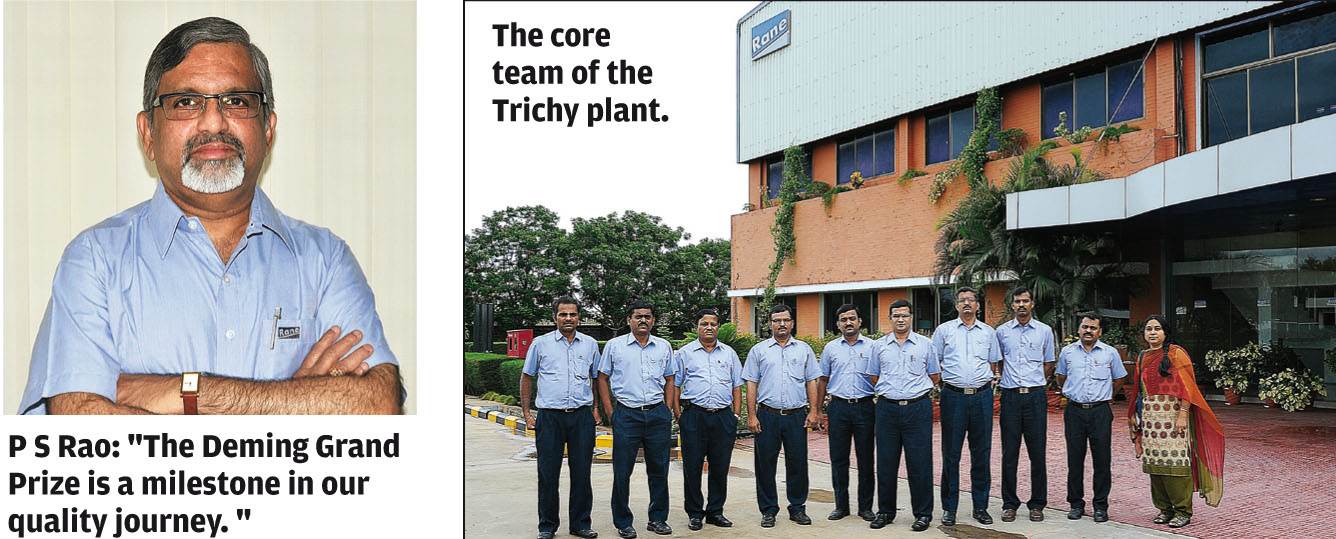
The company succeeded in its negotiations then and, seven years later, RBL became the first friction material company to win the Deming Grand Prize awarded in November 2013. RBL is now planning to export to Japan through its partner Nisshinbo.
The company now plans to achieve a turnover of Rs 700 crore by 2017. That is a significant 83 percent jump over its Rs 382 crore turnover in 2013-14.
The Trichy plant, which this correspondent visited, is expected to contribute nearly 40 percent of that projected turnover. It is the youngest of RBL's four plants (the others are in Chennai, Hyderabad and Pondicherry), and so it’s the most modern. That’s perhaps why the company chose to showcase the plant. “In the near future, Trichy and Hyderabad will be the main locations,” says Rao.
A plant tour helped us understand how brake pads and brake linings are made. But more importantly, it gave us a first-hand experience of quality management processes that RBL has incorporated to help it meet the globally renowned Japanese standards. Customer
focus, operational excellence and HR excellence are the three key factors that helped RBL win the top honour, says Rao.
Empowering employees
In order to climb the business curve successfully, RBL has empowered its employees through its practice of TEI or Total Employee Involvement. As a part of this initiative, the entire workforce of 160 employees is encouraged to be self-directed and contribute towards improving productivity, safety or general improvement of the plant environs.
The management staff of 35 oversees the operations at the plant. “An offshoot of the Deming Prize is the good TEI today,” says Rao. TEI is supplemented by DRM (Daily Routine Management) at the micro level to ensure that the plant’s operations are smooth. Last year, 4,054 suggestions from employees were implemented.
The TEI process helps employees enjoy a sense of ownership and pride in their work. Each employee earns points for every constructive idea. Accumulated points can be redeemed against gifts such as a consumer durable at the end of the year. For example, an employee who may want a refrigerator can work towards accumulating the required points and redeem them.
On the training front, employees are trained under the traditional Indian gurukul model rather than a classroom model. Shopfloor workers are recruited at the age of 18 to 21 years. Before recruitment, they are trained for a 15-day period. They have to pass tests conducted every three days to qualify to be an employee. So far, 16 batches have graduated from the gurukul.
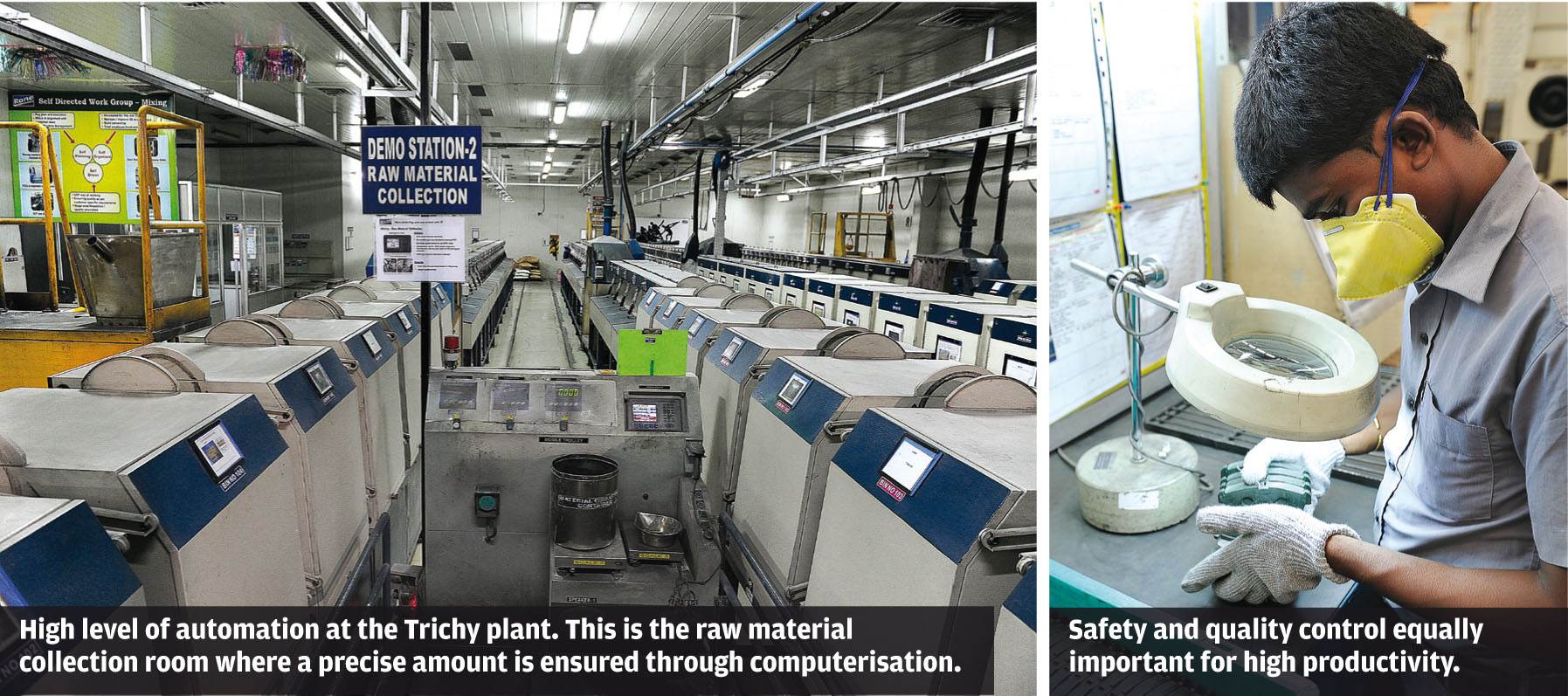
Improving productivity
RBL’s Trichy plant has earned various industrial certifications from auditors. What the company is happy to show is that this facility has been audited and approved by Honda and Toyota Motor. It does not come as a surprise then that the productivity at RBL’s model plant is healthy. Except for its first year of production, the plant has met its set production target every year, which has grown from 31 pieces per man-hour in 2008-09 to 41 pieces per man-hour in 2013-14. In the commercial vehicle brake lining line, it produced 15.1 pieces per man-hour against the target of 15.0 last year.
A majority of RBL’s turnover comes from disc pads, followed by brake linings. The Trichy plant has been designed to mainly produce disc pads, even though it also makes commercial vehicle brake linings. “The plant strategy we have followed is to have a mother plant and a contingency plant. The mother plant’s primary responsibility will be to develop new products, put them into operation and then manufacture on a mass scale. The contingency plant functions as an additional plant for our products segment. For example, in Trichy we have passenger car disc pads as the mother plant,” says S Bhargav, head of the Trichy plant.
The Hyderabad plant is the mother plant for commercial vehicle brake linings. The Trichy plant has a very low rejection level of 10,017ppm in its commercial vehicle brake lining line in 2013-14. Interestingly, the target since 2011-12 has been 10,000ppm. The ppm level in 2011-12 was 14,500.
The above statistics show that RBL is reaping the benefits of imbibing the culture of quality management. The Rane Group had launched the TQM initiative, guided by Union of Japanese Scientists and Engineers (JUSE), in 2000. The continuous focus on quality process improvement has helped RBL and other Rane Group companies – Rane Engine Valve and Rane (Madras) win the Deming Prize.
The Deming is like a ‘good visiting card’ that helps make the first good impression to customers. “But if you let loose slightly in our kind of environment, it can deteriorate very fast,” says Rao, highlighting the challenge a successful supplier faces to maintain the current performance level and build it further.
RELATED ARTICLES
BRANDED CONTENT: Serving India’s EV ecosystem
Shimnit Integrated Solutions Pvt. Ltd. (SISPL), a subsidiary of Mumbai's leading high-security number plate supplier, Sh...
Driving EV business with agility and flexibility
CEOs from the EV startup ecosystem met in Bengaluru and Pune to discuss the challenges and business opportunities.
BRANDED CONTENT: SM Auto and Gotech energy inaugurate their first battery pack assembly plant in Pune
Pune-based SM Auto Engineering (SMA), a leading automotive component system manufacturer and its partner Gotech Energy (...





 02 Jul 2014
02 Jul 2014
 19908 Views
19908 Views



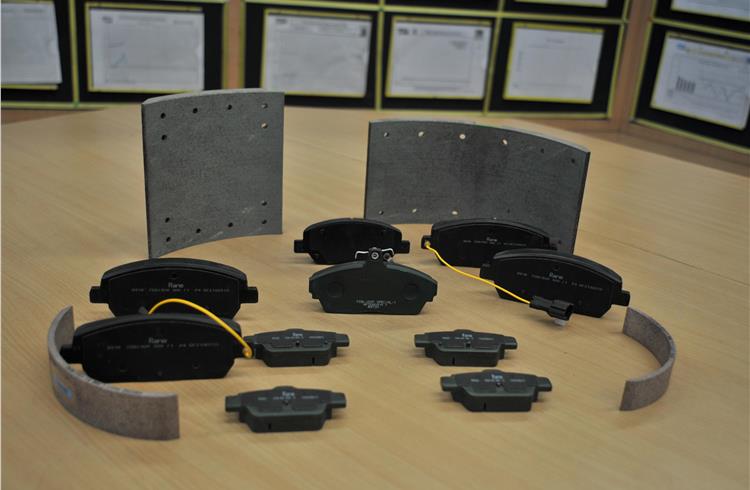
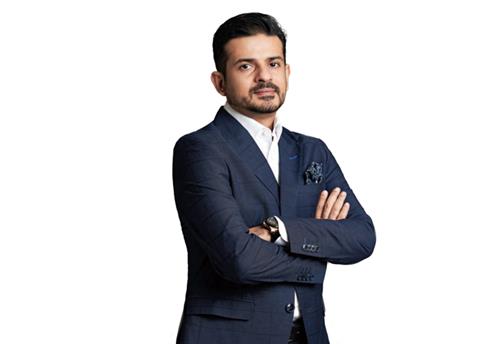
 Autocar Pro News Desk
Autocar Pro News Desk

